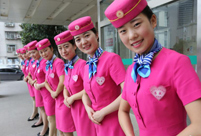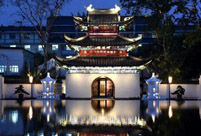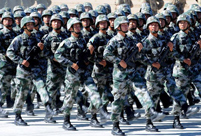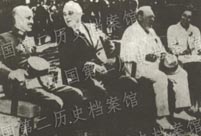 YOG kicks off in Nanjing
YOG kicks off in Nanjing
 Colorful life at Youth Olympic Village of Nanjing 2014 YOG
Colorful life at Youth Olympic Village of Nanjing 2014 YOG
 Royal Taoist temple to open to public
Royal Taoist temple to open to public
 Female soldiers at quake-hit area
Female soldiers at quake-hit area
 Shocking photos of cruel battles in Ukraine
Shocking photos of cruel battles in Ukraine
 Amphibious armored vehicle unit conducts open sea drill
Amphibious armored vehicle unit conducts open sea drill
 Water relay in Henan
Water relay in Henan
 Ethnic culture feasts eyes of travelers
Ethnic culture feasts eyes of travelers
 80 security dogs assembled in Nanjing police dog training base
80 security dogs assembled in Nanjing police dog training base
 Graffiti artists paint on street walls in Xinjiang
Graffiti artists paint on street walls in Xinjiang
BEIJING, Aug. 25 -- China's top legislature has begun reviewing a draft amendment to the 20-year-old Advertisement Law that aims to ban tobacco advertisements in more public venues and online.
"Tobacco advertisements directly or indirectly transmitted via radio, film, television, newspaper, magazines, books, audio and visual products, electronic publications, telecommunication networks and the Internet are banned," the draft amendment obtained by Xinhua said.
Meanwhile, the draft includes more specific public venues where tobacco ads would be banned, such as libraries, cultural centers, museums, parks, waiting rooms, theaters, meeting halls, sports auditoriums, and near hospitals and schools.
"Outdoor tobacco advertisements are forbidden," it said.
The bill, submitted Monday to lawmakers, reflects a heated anti-smoking battle in the country. In June, scholars, health and legal professionals and tobacco control experts jointly signed a letter to the national legislative body, urging them to fully outlaw tobacco advertising.
In 2003, China signed the WHO Framework Convention on Tobacco Control (FCTC). It requires signing parties to "comprehensively ban all tobacco advertising, promotion and sponsorship."
Showing actual smoking or drinking in ads will be prohibited, as will images of minors, and promotion of binge drinking. Adverts must not imply that smoking and drinking have positive effects such as "relieving anxiety ".
Tabled to the Standing Committee of the National People's Congress for the first reading at its bi-monthly session this week, the amendment "further regulates advertising, boosts the development of advertising industry and protects consumers", according to an explanatory document for the lawmakers.
The draft carries harsher punishment for giving false information, including functions, ingredients, expiration dates and prices of advertised products or services.
Clients, makers and publishers of false adverts will be fined three to five times the advertising fees, the draft says, raising the minimum from the equal of advertising worth in the current law. In the case of the absence of an exact advertising fee, a situation untouched in the current law, parties will be fined between 200,000 yuan (32,500 U.S. dollars) and one million yuan.
Those promoting or selling banned products or services will pay five to ten times the advertising fees as punishment if they commit such violations for more than three times within two years. When no benchmark fees are available, fines will range from one to two million yuan.
All parties will be suspended from doing businesses, and in severe cases, striped of business licenses.
 Special holidays
Special holidays World's top 10 fighters
World's top 10 fighters 'Stewardesses' serve in hospital
'Stewardesses' serve in hospital Beautiful night scenery of Nanjing
Beautiful night scenery of Nanjing ‘Peace Mission -2014’ joint anti-terror military exercise kicks off in China
‘Peace Mission -2014’ joint anti-terror military exercise kicks off in China Eye-catching guides at the opening ceremony of YOG in Nanjing
Eye-catching guides at the opening ceremony of YOG in Nanjing A female missile launch company of PLA
A female missile launch company of PLA China, the U.S., Britain and the Soviet Union call for Japan's unconditional surrender
China, the U.S., Britain and the Soviet Union call for Japan's unconditional surrender Photo story: How a baby panda grows up
Photo story: How a baby panda grows up Star-leveled nursing home in a small county
Star-leveled nursing home in a small county Evidence of monstrous crime of Japanese invaders
Evidence of monstrous crime of Japanese invaders Foreign models compete with Chinese in Cheongsam show
Foreign models compete with Chinese in Cheongsam show The beautiful pictures of ancient Chinese architecture
The beautiful pictures of ancient Chinese architecture The Muslims involved in relief work
The Muslims involved in relief workDay|Week|Month